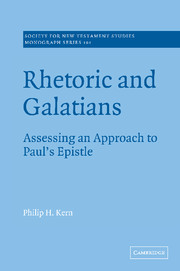Book contents
- Frontmatter
- Contents
- Preface
- List of abbreviations
- 1 Introduction
- 2 Towards a definition of rhetoric
- 3 Methods of rhetorical analysis and Galatians
- 4 Rhetorical structure and Galatians
- 5 Rhetorical species and Galatians
- 6 The language of Paul's letters: 1. As evaluated by early Christian writers
- 7 The language of Paul's letters: 2. The contribution of modern studies
- 8 Conclusions
- Select bibliography
- Index of subjects
- Index of modern authors
- Society for New Testament Studies
3 - Methods of rhetorical analysis and Galatians
Published online by Cambridge University Press: 22 September 2009
- Frontmatter
- Contents
- Preface
- List of abbreviations
- 1 Introduction
- 2 Towards a definition of rhetoric
- 3 Methods of rhetorical analysis and Galatians
- 4 Rhetorical structure and Galatians
- 5 Rhetorical species and Galatians
- 6 The language of Paul's letters: 1. As evaluated by early Christian writers
- 7 The language of Paul's letters: 2. The contribution of modern studies
- 8 Conclusions
- Select bibliography
- Index of subjects
- Index of modern authors
- Society for New Testament Studies
Summary
Rhetorical analyses of Galatians are necessarily selective regarding both the data they adapt from the classical world and the methodological avenues they pursue. This chapter will identify the choices made and, at times, question their appropriateness. It will begin with the classical sources which inform the discussion.
Sources
The agenda as set by Betz and reaffirmed by Kennedy is to look to the Graeco-Roman rhetorical handbooks as sources for the material of the discussion. These are as follows: Aristotle's Ars Rhetorica; Rhetorica ad Alexandrum (pseudonymously attributed to Aristotle); Cicero's De Inventione, De Optimo Genere Oratorum, Topica, De Oratore, De Partitione Oratoriae, Brutus, Orator; De Ratione Dicendi; pseudo-Cicero's Rhetorica ad Herennium, Quintilian's, Institutio Oratoria. Of the works of Cicero, only De Inventione is a true handbook, the rest being dialogues – but they have all been used to varying degrees by readers of Galatians.
These works are easily misconstrued. Indeed, the melting together of the various rhetorical sources has caused confusion. The classical sources employed to analyse Galatians, while all attempting to describe the same type of rhetoric, are not all of the same cloth; they require critical investigation before they can help us understand Paul.
This has occasionally been recognized in NT studies, as attested by F. W. Hughes:
It might be easy to come to the false conclusion that Graeco-Roman rhetoric was a single, rather tightly unified system. In order to introduce most New Testament colleagues or others to the complexities of different systems of rhetoric, everyone who attempts to systematize rhetoric (including the present reviewer) runs the risk of making Graeco-Roman rhetoric look more unified or uniform than it really is likely to have been, in actual practice.
- Type
- Chapter
- Information
- Rhetoric and GalatiansAssessing an Approach to Paul's Epistle, pp. 39 - 89Publisher: Cambridge University PressPrint publication year: 1998



